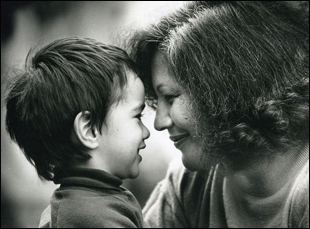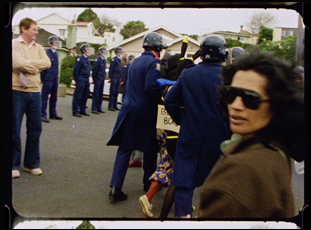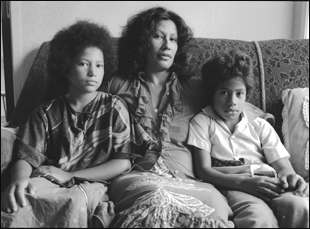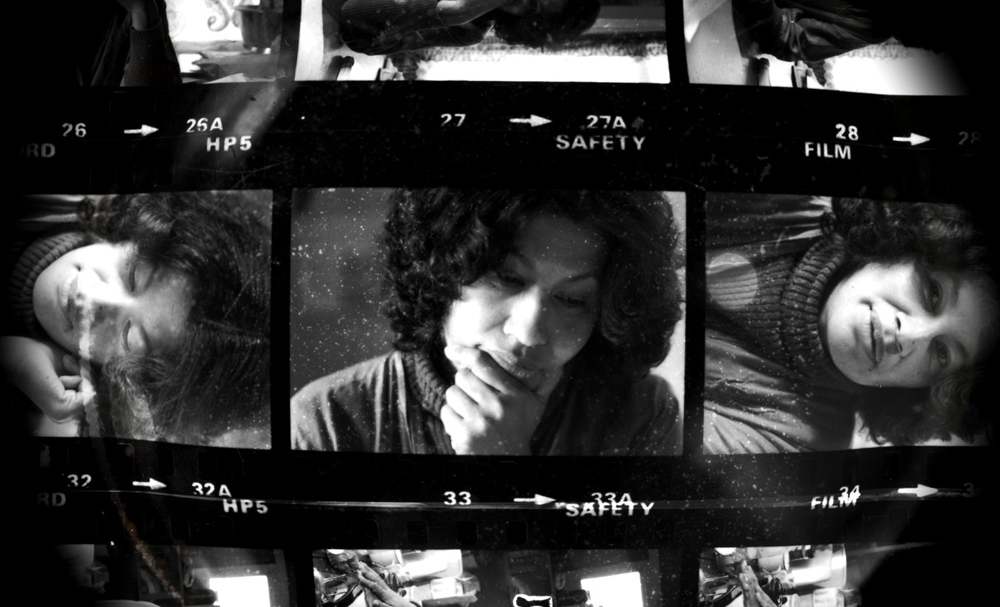It isn’t unusual for filmmakers to rush around town for the opening weekend of their film, trying to do all the Q & As they can. But in the case of “Merata: How Mum Decolonized the Screen,” director Hepi Mita and producers Chelsea Winstanley and Cliff Curtis sought to honor the subject of the film not only by scheduling the release date for Mother’s Day to celebrate Mita’s late mother Merata, who raised a family of five as she became the preeminent chronicler of Maori culture in New Zealand, but to strive for her ambition to connect the world, requiring the team to run out of a Q & A in Wellington to get to another…in Los Angeles.
“We were conquering mothers all over the world!” exclaims Winstanley, who had helped arrange a sprawling release around New Zealand in which a member of Mita’s family would be on hand at screenings of the film in various cities before converging in Wellington where they could relieve Hepi, who would leave for the States, although a dense fog made it nearly impossible for his sister Awatea to arrive, making it especially gratifying when she did. “It was this beautiful passing of the baton and we raced off, just got our plane, landed in L.A. and customs was terrible. It was taking forever just to get through and we jump in a car from the airport and the GPS is saying that we’re going to be there in like 20 minutes [which was the start time]. I’m sure Merata was intervening the whole time, but we made it just in time for the introduction.”
In fact, the time seems right for the rest of the world to know about Merata including her son Hepi, whose own unfamiliarity with her professional career as a groundbreaking filmmaker becomes a compelling starting point for this tender look back at her life. While Merata was never too busy to tend to her children, they could only see her as a mom rather than as a cinematic pioneer who made sure that their generation and the others to come would see the Māori represented both in front of the camera and behind it, making documentaries that could celebrate the culture and chronicle the injustices they faced as indigenous people as she brought in other aspiring Māori filmmakers into her productions so they could become a part of the New Zealand film industry.
There is some poetry in the fact that Curtis, who rose to become one of New Zealand’s most prominent actors after roles in “The Piano” and “Once Were Warriors” after Mita broke down some of those barriers, proposed to Hepi, who had no prior experience in making films despite being the son of two filmmakers – his father was the late Geoff Murphy – the opportunity to tell his mom’s story. With the guidance of Curtis and Winstanley, a celebrated filmmaker in her own right as a director for the anthology film “Waru” and a producer of “What We Do in the Shadows,” Mita is able to share a sense of revelation that audiences are likely to feel as he is able to see Merata in all her dimensions, giving other women strength by speaking openly on public television about aborting an unwanted pregnancy, going toe-to-toe with Robert Mugabe in an interview, and bravely keeping her camera rolling when police attempted to force Ngāti Whātua tribe off their native soil for the doc “Bastion Point Day 507.”
Naturally, “Merata” is being released by the fierce women at Ava Duvernay’s distribution company ARRAY, rolling the film out to theaters in America following its premiere at Sundance earlier this year and making it available internationally on Netflix, and during a recent visit to their offices, Mita and Winstanley spoke about Merata’s enduring influence, collecting all the pieces of a story that existed all over the place both geographically and narratively, and creating the space to craft a fitting tribute to such an extraordinary person.

Hepi Mita: At that stage in my life, I had given up a career in journalism in the United States where I had lived continuously for 12 years, and I had returned home and I was dealing with grief. Documentary filmmaking wasn’t on the radar, and I knew people were interested in the story, but I didn’t feel personally that I had the confidence to reach out and do that, but sometimes you’re never going to be ready. If you’re waiting to be ready, it’ll never come. You just need to be pushed and going through the process and making mistakes along the way, that’s what makes you ready. So with the challenge issued to me and [this being] a reflective place for me in my life, I was still processing the grief that I had experienced, [but this was] a way for me to work through those feelings.
Chelsea Winstanley: Yeah, I worked with Merata on her last film [“Saving Grace – Te Whakarauora Tangata“] when she passed away, so it left a real empty space for me and I never felt like I had the opportunity to resolve that, so the opportunity of making this film with Hepi was really an opportunity to do my own grieving as well with it. Hepi and Cliff [Curtis] took me to a cafe in Wellington and I thought it was just a catch-up – “hey, what are you up to?” I had just finished making “What We Do in the Shadows” and I just had this little baby, so I’m thinking, “oh hey, maybe I’m going to have some time off.” But Cliff’s very direct and pretty much is, “I’m making this movie, Hepi’s directing it. We want you to produce it.” I’m like, “Ohh…ok?” [laughs] But really there was no hesitation it’s seldom when you get the opportunity to work with your mentor, so I was very fortunate to do that, and my initial love for storytelling was in directing, so I knew this was probably going to be the last thing I was going to produce for some time and it was going to be a nice segueway — actually a kick up the bum to get me into directing because no excuses, you know, like if [Merata] could do that with five kids, it’s like, what? [laughs]
I found that parallel pretty striking in knowing about your background. Chelsea, was there anything that was important for you to convey about that experience?
Chelsea Winstanley: Oh my gosh, no one could compare themselves to her and what she went through. [laughs] Honestly, I did an interview with a woman that was hosting the screening back home who was actually someone who came from Bastion Point, the film that’s presented in the documentary about land rights, and that particular tribe who had their land taken off them and she said, “Chelsea, I remember you…” because she was a generation ahead of me, and she said, “We remember you, we’ve watched you come through this career, we’ve seen you develop and all that – how’s that been for you?” And I thought to myself the only reason Sharon has seen me is because she and other strong Maori women like her and Merata paved the way for me. So it’s really important to acknowledge those that have been before you because their journey has always been a bit harder than yours.
Hepi Mita: One of the things I was self-conscious about wasn’t only the intimacy of the whole thing, but you look at my mother’s story and she’s an indigenous, dark-skinned woman bringing up a family while she enters into this film world without any skills or background, basically coming out of poverty. And then I looked at my own position – light-skinned, male, no kids, coming from quite a bit of privilege. [laughs] So there’s kind of an authenticity thing that I needed to deal with, and having [Chelsea] onboard as someone who was a working mother in the industry – I know her daughters and play with them and in many ways, I could empathize and relate to them because they’re living in Hollywood, and I grew up in a very similar way – so although there’s obvious differences between Chelsea and my mother, I at least felt those parallels were very strong and that maternal drive and that perspective was essential. She was also very, very nurturing and very patient with me. She and Cliff were considerate enough that they didn’t impose their ideas or their perception or their vision of how my mother’s story should be. They let me craft that and make my own mistakes and learn along the way and I’m very, very thankful.
Chelsea Winstanley: When I was first asked to be involved, I saw my role as a guardian for [Hepi]. I knew this was his first directing gig, so we didn’t want to push him into anything or impose any timeframes on him. In order to do that, we had to make some pretty big decisions, things like when the funding first came in, there was investors involved from the New Zealand Film Commission and the budget was healthy, but if we were to sign that contract at the time, that meant that they would have a commercial imperative and a financial stake in the film. And that didn’t sit well with me as the lead producer, so I went back to the team and said, “Let’s think about the holistic approach to this film. What are we trying to do and are we trying to preserve for the generations to come? How can we honor her legacy in the best way possible?” Well, no one should have an ownership of this film except for the family, so we went back and looked at all the contracts and basically chopped our budget in half, which meant that we’d only have a grant status. And although people would say, “You’re crazy. Why would you give up that money?” It wasn’t really giving up money. It was actually maintaining our integrity throughout the entire process.
What was the process like of collecting materials for this?
Hepi Mita: It’s funny, even before Cliff offered me the challenge when my mom passed away, we went to her house, and it’s always nostalgic and sad going through someone’s things after they passed. But then we looked in the garage and it was stacked from floor to ceiling with film cans and old video tapes and equipment. [laughs] Some film wasn’t even in cans. It was just on the ground and it was crazy. She had been hoarding films from the late ‘70s to the early 2000s and every possible format you could possibly imagine. It was like three cargo vans’ worth of material and we took that to the film archives. They took one look at it and were like, “Hey, you want a job going through that stuff?” So I spent years going through her personal collection before the film even started.
And what that does as well is move it beyond the scope of just going through my mother’s personal collection of films. It widened it out [for me to think], “Oh, there’s other film archives in New Zealand. Let’s find all the stuff that people filmed of her.” So once I scoured all that, it’s like now I’ll put in a request for all the Australian film archive holdings and I found some home videos and some of her lectures. And I looked in Hawaii and there were these great interviews with her and other activists, and I had a contact in Europe, so it became global. I was still finding stuff right up until we were locking off the film and I think I went through most conceivable archives — I’m not going to say everything because I wouldn’t be surprised if five years from now, somebody comes up with a recording of her and I would’ve been like, “Man, that would’ve been great for the documentary.” It’s funny I even had a nightmare when we were doing the editing – [where] it’s like I locked the cut and someone showed me this footage of her that just completely revealed a secret and blew everything open.

Hepi Mita: Yeah, she spent a lot of time working with the native Hawaii film community, so I went conducted a lot of interviews with people about her time there and when I was going through the Hawaii film archives, I found interviews with her talking and working with people, but there’s a big difference between people reflecting on events, but then to see those connections take place within a conversation between my mother and significant figures within that community. Just a little 20-second [clip] of her talking about Haunani-Kay Trask, a brilliant mind in the Hawaiian sovereignty movement, made all of those interviews a complete waste of time.
There was also the very [first appearance of] my mother, and I go quite a bit into it in the documentary, that was a restrictive item in the New Zealand television archive. All I saw of that was a shotlist [initially] and what piqued my interest was how early it was, but also the fact that it had images of my older siblings. That’s why I watched it and when I pulled it up and heard her talk about the struggles about being a solo mother and abortion rights in New Zealand – these are stances that I never heard or knew about. I heard her have conversations on the abortion debate when I was young and I could remember them, but I didn’t know she spoke about her own firsthand experience on New Zealand public television and at that time, there was one channel, so [it was only] if you happened to be watching television at the time she was on, you would’ve heard her talk on that issue. There were so many things like that that were eye-opening for me.
Chelsea Winstanley: I was making a television series way back in the day [where] we did a profile on her because this series was profiling Maori artists in different disciplines and I actually got the opportunity to see a lot of archive stuff that he hadn’t seen, so when he was talking about one thing in particular – when he talks about [that] first appearance on television and she talks about housing situations and abortion, I had seen that before [but I knew Hepi] hadn’t and I didn’t want to, in any way, prompt him for what he was about to watch because this was a journey of discovery for him, but I did know a little bit about what he was in for.
Did your idea of what the film would be change from its initial conception?
Chelsea Winstanley: Yeah, the story changed a lot as we went on. In the beginning, [Hepi] wasn’t even going to be featured at all. It was just going to be her voice.
Hepi Mita: I always wanted my mother to speak for herself and I was always self-conscious about putting words into her mouth, which is so easy to do in a documentary. So I thought I don’t necessarily have to narrate it, but I could guide the audience through it and my own experience of discovery [would be] a door for wider audiences. And the very first interview we did, the person referred to my mother as “your mother,” speaking to camera and from that moment, I thought, “Oh, I’m doomed. There’s no way for me to get out of it now” because it was a great and powerful statement. So getting comfortable with that [required] about two years of soul-searching of “How do I do this in a way that honors her?” I was not very comfortable with it because I feared whether or not I had the authenticity and the experience to tell that story, so I really had to consider my way through that, but when I was watching back my interviews with my family, just the tone of was never like a formal interview. It was always me and my brother or my sister having a conversation and you can hear my voice and see me react to them.
Chelsea Winstanley: And [Hepi] interviewed all sorts of people and we had to make sure that he understood that it’s okay you don’t have everyone in the film. You don’t have to feel bad about leaving people on the cutting room floor. That’s just research for you to understand your mom a bit more. And that’s what came out at the other end is this beautiful story about a son discovering his mother.
Hepi said in another interview that you actually interviewed your father, but decided not to include. How did you come to that decision?
Hepi Mita: [My father] is a very prominent filmmaker in New Zealand. He’s worthy of a documentary in and of himself, but at the same time, he’s an older, caucasian male and so much of my mother’s career had been defined by her struggle against not only against that demographic, but also shaped by it in terms of them being the gatekeepers. A lot of portrayals of women in film and in media are centered around the men in their lives and it’s particularly complex when it’s a man of that kind of public profile, so even though I interviewed him, I realized I can’t have him speak for her. It’s just an affront to the principles that she stood for, so even though there is value in having that interview recorded, it didn’t fit for this documentary.
But from the very beginning, I knew my family would play a big role in it and that’s one of the reasons I thought Cliff’s approach was appropriate because family was an essential element to her story. I also wanted to do my due diligence because my mother worked across the world with so many different people — almost like Madonna, she reinvented herself multiple times, so I interviewed people from all those walks of lives. I had a list of them and last I counted, it was something like 72 people who I spoke to. But it always came back to the family and I looked at the archival films and I saw the children literally grow from being these little kids to adults, [which was] this presence across whatever reinvention or whatever phase she was in in her life. Because I’d never made a film before Cliff issued that challenge, I wanted and needed to make those [pathways] in order to fully commit 100% to that family element. I also felt a little self-conscious [because] I knew their story was incredibly moving and there were all these elements that were really cool and interesting, but I [wondered] is this stuff only interesting to me because it’s so incredibly personal? I wasn’t confident that degree of intimacy would translate to a wider audience.

Hepi Mita: That’s the privilege and the pleasure of it was when I started interviewing my family members, the first questions were just like, “What are your earliest memories?” Or what do you remember from when you were a kid and what do you think of that now?” Although a documentary about my mother was the framework in which that conversation was sparked, for me as a little brother, it was getting to understand their view on it all and getting to contextualize that stuff. There were so many times where it’s like finding out these stories, I was like, “That answers a lot.” Or “That’s why you’ve never liked that film” or “That’s why mom didn’t talk about that,” explaining the family dynamic realizations. I recorded probably an archive of [about] 60 hours of audio from those conversations, none of which made the film, but it’s just me getting back to basics and understanding things because as a family, you go through experiences and you don’t necessarily sit down and take time to reflect. This process was actually a time to process that — I think it was my sister who referred to it as free therapy. [laughs]
What’s it like putting this out into the world?
Hepi Mita: It touches on that fear of how intimate it was and whether that would relate. Of course, those fears have been blown away by the reception of people. It was insane coming to the United States to an audience who may not even know where New Zealand is on a map, but could relate to the struggle of a solo mother trying to take care of her family or a child trying to find out about a parent. There were all these other issues that I always worried about, like the political things that she dealt with that are specific to New Zealand, but you don’t need to have a deep understanding [because] when you see oppression, police brutality, or people being evicted off of their land, you don’t need a political degree to just know that’s wrong instinctually.
Chelsea Winstanley: It’s like what [Merata] says, “Our problems aren’t just specific to New Zealand.” Almost every indigenous culture throughout the world has somehow been colonized or somehow oppressed, so it’s also not just about a son discovering his mother and the love of a son and his mother, but the struggles of marginalized people that people can connect to. And we needed to show that she was creating this international community with what she was doing. Even though she was an incredible filmmaker and had so many ideas about different films she wanted to make, she knew that in order for her and for indigenous people and marginalized people to make their work, she actually needed to create the community in a beautiful selfless way and that’s what didn’t exist. She actually took a step back and she created a community which we now all enjoy. We have all these amazing relationships with First Nations Canada, with the Native American people here in America, with the aboriginal people in Australia, with Taiwan – all these different communities all over the world because of the work she did. She put her own creative aspirations aside for a little bit to ensure that we now have this. That’s how amazing she was, thinking about others all the time.
Hepi Mita: So those fears were alleviated and even more so, people could could relate to that search in their own lives, that discovery of their own family stories or traumatic events that they had suppressed, and seeing how my family dealt with that was inspiring to them. That was very validating, not just for me, but for my other brothers and sisters. Each one of them hosted a different premiere in New Zealand and we all gathered in the capital before I got on a plane to Los Angeles, so they all got that experience of doing a Q & A with an audience who had that emotional reaction and they could see how their part of our mother’s story related to a greater context and it’s incredibly validating because they could see the sacrifices and the trauma that they went through as children went towards a greater cause. That’s something that is inspiring not just filmmakers, but people of color, mothers, people from all kinds of walks of life to this day and there’s no greater payoff than that.
“Merata” is now streaming on Netflix. It will also continue to screen theatrically on June 6th at the Ark Lodge Cinema in Seattle, June 13th at the Houston Museum of Art and June 29th in Atlanta at the Hammonds House Museum.




